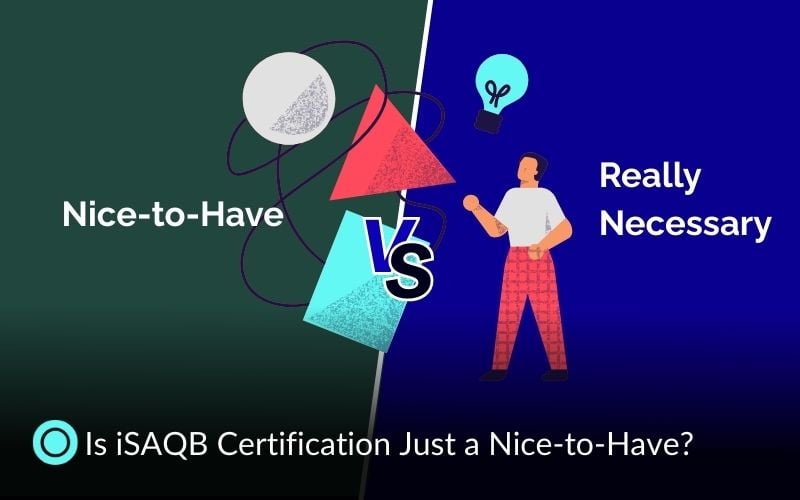Some professionals ask: "I already have experience, do I really need iSAQB?" Others are just starting their architecture journey and want a clearer path. In this article, we look at the necessity question from both sides, using real voices and keeping their words intact.
Start here, pillar guide: Top 10 Questions About iSAQB, Answered by Real Architects
Related deep dive: Is iSAQB Certification Worth It? A Complete Guide with Real Stories
Is iSAQB necessary for you, or simply a powerful accelerator?
Find your answer here.
What Do Professionals Really Think About the Necessity of iSAQB?
The “Absolutely Yes” Perspective
Some participants, especially those earlier in their architecture careers, view iSAQB as essential for gaining a structured mindset, learning systematic approaches, and improving stakeholder communication. For example, Kristina van Cappelle stressed that the Foundation level should be done by every serious developer, and Alexander Pritzkau called it an “absolute standard” for architects.

The foundation layer is something you can do in four days. It's not even a question, I think that it should be something that every developer who is taking his job seriously should do.
Similarly, Alexander Pritzkau, described the iSAQB CPSA-Foundation level as the absolute standard. For him, it provides the essential overview of what an architect’s role in an enterprise context really is, which makes it absolutely necessary for professionals aiming to work seriously in architecture.
The “Depends on Context” View
Several professionals, like Lukas Kamber, Stephan Schlatter, Tobias Ammann, and Darshan Shah, pointed out that necessity varies by career stage, role, industry, and personal learning style. For juniors or mid-level professionals, it’s a big accelerator; for experienced architects, it can still be valuable but is less critical if they already have strong skills and experience.

It's not strictly necessary, you can acquire the same knowledge on your own. But given the breadth of the topic, it can quickly become overwhelming. In the end, it depends on your personal learning style. However, completing the course does offer a clear way to demonstrate to future employers that you have expertise in this area.
Darshan Shah, added that beginners can benefit greatly from the structured knowledge the certification provides, while experienced architects might find the training less rigorous than what they would expect to truly challenge their expertise.
The “Not Mandatory but Helpful” Angle
Others, including Raphael Suter and Julius Chrobak, said it’s not strictly required to succeed as an architect, but it can make learning more efficient, broaden perspectives, and serve as a recognized proof of skills, especially useful in markets where iSAQB is well-known.

iSAQB certification is not necessary. If you have little to no experience as a SW-Architect, it is a very good start. Plus it is helpful to showcase your knowledge.

It's nice to have some level of certification in hand focusing software architecture.
When Might You Not Need iSAQB Certification?
If you are already an established architect with years of a wide range of project experience, the certification perhaps won’t teach you much you haven’t picked up on the job. Julius pointed out that in such a situation, the only significant risk is committing time and money to modules which are not directly applicable to your work. Lukas and Stephan felt that although the training represents a good, formal, structured beginning-point where there is limited or no formal architecture background, highly experienced architects may achieve comparable knowledge by self-study or practical experience.
The point of the takeaway is that the value of iSAQB is entirely dependent on where you come from. If your everyday work already encompasses wide architectural thinking, stakeholder communication, and intricate problem solving, the value may be less about acquiring additional skills and more about receiving formal recognition.
When Is iSAQB an Advantage You Can’t Ignore?
Several participants made it clear that there are situations where iSAQB can be a real differentiator. In markets where the certification is widely recognized, such as Germany and Switzerland, having it on your CV can immediately signal credibility to employers and recruiters.
Tobias Ammann explained that in his own recruitment experience, iSAQB training often acted as a reliable indicator of a candidate’s capabilities. He noticed a strong link between candidates who had completed some level of iSAQB and the overall impression they made in interviews. This shared baseline of knowledge made it easier to compare applicants and assess their readiness for architecture roles.
It can also give mid-level architects or experienced developers aiming for an architecture role a clear edge in interviews. For those moving into international roles or competing for positions in larger enterprises, the shared terminology and frameworks learned through iSAQB can help you stand out and integrate more quickly into new teams.
When recognition, competitive positioning, and a clear signal of expertise matter, iSAQB becomes more than a learning experience.
What Type of Architect Benefits the Most from iSAQB?
From the interviews, three clear profiles emerged as those who gain the most from iSAQB training.
Mid-Level Architects Looking to Level Up
Those who had some architectural responsibility but needed a defined framework particularly benefited from iSAQB. It gave them methods, terms, and models that helped make their decisions more rational.
Solution Architects Working Closely with Non-Technical Stakeholders
For professionals who need to span technical and business teams, iSAQB's focus on communication, documentation, and quality needs clearly resonated. A number of attendees commented on the training assisting them in better explaining and defending architectural choices.
Software Engineers Transitioning into Architecture Roles
Many saw iSAQB as a roadmap for moving from development into architecture. The structured curriculum offered guidance on what to focus on first, how to think at a higher system level, and how to adopt the mindset of an architect, something that’s difficult to pick up solely from day-to-day coding work.
Expert Verdict – Necessary or Not?
For all of these discussions collectively, there wasn’t a single answer which held true for all.Some, like Stephan Schlatter and Lukas Kamber, regarded the Foundation level as a non-negotiable starting point for a serious architect or developer. Others, like Lukas Kamber and Stephan Schlatter, considered it useful but not mandatory, which would depend on stage of career and individual learning style.
Several participants fell in the middle ground, echoing Tobias Ammann’s sentiment that while iSAQB could be considered optional in theory, in practice it often becomes essential in certain markets or career moves. Raphael Suter summed up this pragmatic view by calling it “nice to have” yet always a good thing to pursue.
The consensus of their combined experience is straightforward: iSAQB isn’t mandatory across all, but for professionals, it’s a credible means of certifying skills, widening networks, and dealing in architecture in a unified and stronger framework.
Still Unsure? Here’s What to Consider Before Deciding
If you’re unsure whether iSAQB certification is the right move, the insights from participants point to a few questions that can guide your decision:
-
What’s your career goal? If you’re aiming for roles in architecture or leadership, the certification can help you stand out, particularly in structured corporate environments.
-
Where are you in your career journey? For newcomers or mid-level professionals, it provides a clear framework to accelerate growth. For highly experienced architects, the main value may lie in formal recognition and networking.
-
Do you feel gaps in your knowledge? If you often find yourself improvising solutions or lacking a consistent architectural framework, iSAQB could give you the structure and tools you’re missing.
-
Is the certification valued where you want to work? In some markets, employers explicitly ask for it. For example, in Germany, job postings for Software Architect,Hybrid highlight that an iSAQB CPSA certification demonstrates “Expertise in software architecture and a high professional standard” (Randstad Digital Germany AG).
These checkpoints can help you decide whether iSAQB is the next strategic step in your career or something to revisit later.
Conclusion
The interviews expressed a variety of opinions, from those who view iSAQB as a crucial cornerstone, through those who see it as a robust but voluntary professional development. It has its greatest influence in transition scenarios: advancing from mid-level to senior architect roles, exiting development into architect roles, or gaining confidence to tackle complex stakeholder scenarios.
For seasoned professionals, the advantage tends to be less related to new technical information and more related to refining approaches, verifying expertise, and establishing reputation in competitive markets.In countries like Germany, the credential can carry significant weight in hiring decisions, sometimes tipping the scales in a candidate’s favor.
Ultimately, the decision comes down to your goals and context. iSAQB won’t be the only path to becoming a capable architect, but for many, it’s a structured, well-recognized route that accelerates growth and opens doors that might otherwise remain closed.




